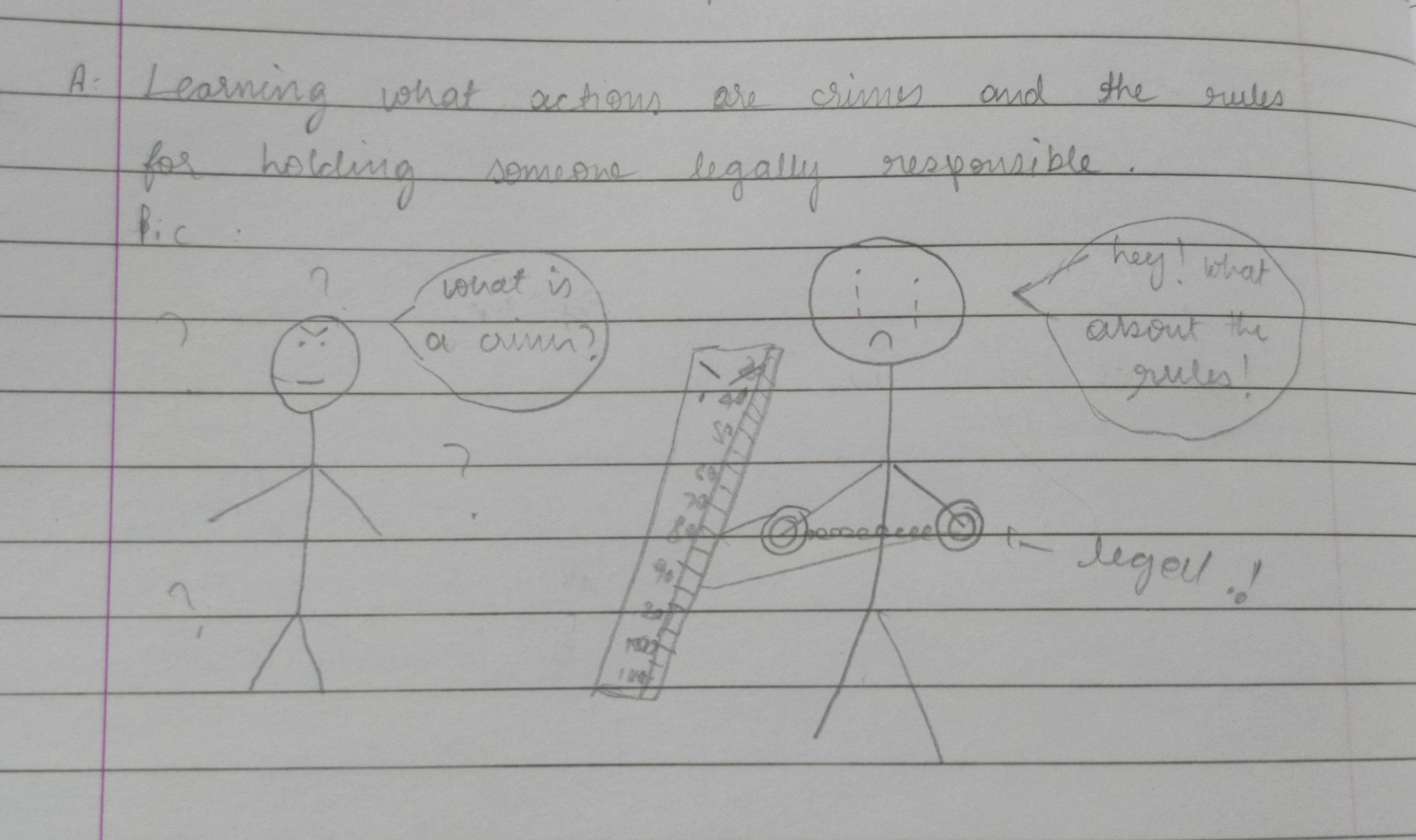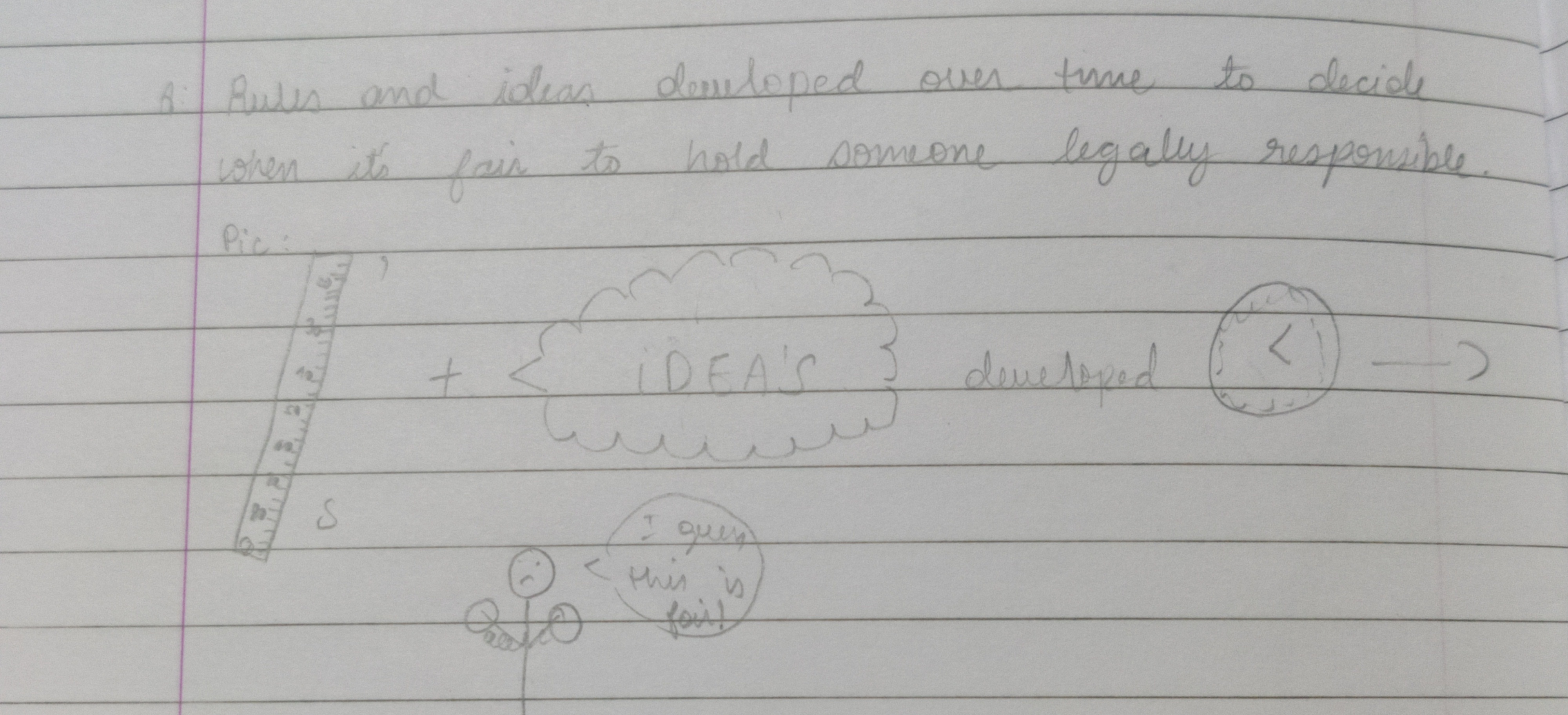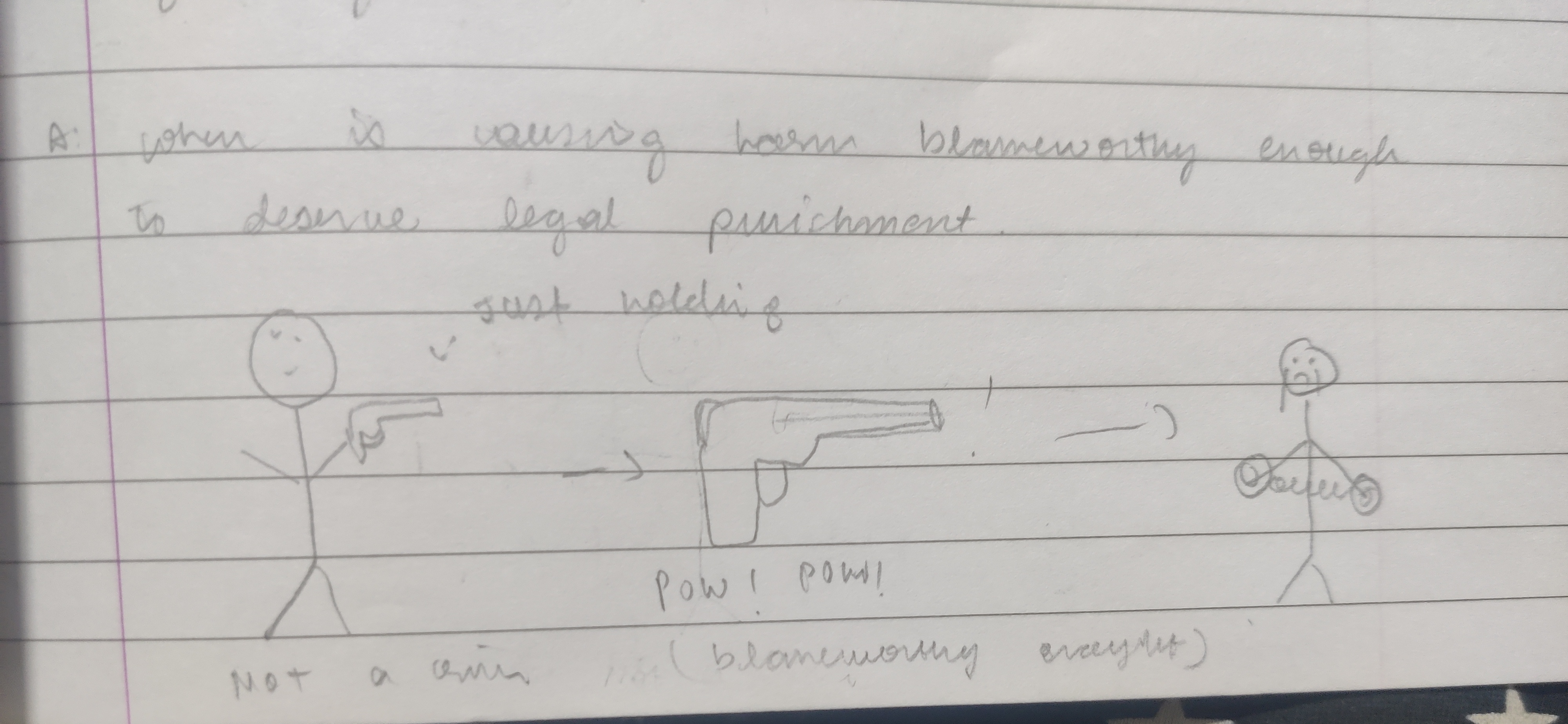Criminal Law Ch 1
1/83
There's no tags or description
Looks like no tags are added yet.
Name | Mastery | Learn | Test | Matching | Spaced | Call with Kai |
|---|
No analytics yet
Send a link to your students to track their progress
84 Terms
What is a crime?
A crime is an act that causes social harm by violating rights and duties shared by the whole community.
Why does a crime harm the entire community, not just the victim?
Because it breaks a rule that protects everyone in society, affecting shared rights and responsibilities.
What is an example of a shared right in society?
The right to remain safe is a shared right that belongs to everyone.
What type of law is criminal law considered to be?
Public law.
Who handles crimes under criminal law?
Public lawyers, such as prosecutors, who represent the entire community.
Why don't private lawyers typically handle crimes?
Because crimes are considered offenses against the public, not just individuals.
What is criminal law?
Criminal law is the area of law that defines what actions are considered crimes.
What does the study of criminal law involve?
Learning what actions are crimes and the rules for holding someone legally responsible for committing them.

What is the main punishment in a criminal case?
The criminal conviction itself, not just jail time or a fine.
Can civil cases result in a loss of liberty?
Yes, such as involuntary confinement for mental illness or sexual predation.
Is a criminal punishment always harsher than a civil one?
Not necessarily; it can be greater or even less, depending on the situation.
What truly distinguishes criminal law from civil law?
The public shame, societal condemnation, and stigma that comes with a criminal conviction.
Why might someone prefer jail over a civil judgment?
If they lack money, jail may be less burdensome than paying steep fines in a civil case.
When does it become hard to distinguish criminal law from civil law?
When the law treats behavior as a crime even though it may not deserve moral blame.
What is the role of a guilty verdict in criminal law?
It expresses society's moral outrage and condemnation of the behavior.
What is criminal law supposed to reflect, beyond just legal wrongdoing?
Moral wrongdoing — the idea that the act was not just wrong, but morally wrong.
Why is blurring the line between criminal and civil law a problem?
Because criminal law involves moral condemnation, applying it to behavior that lacks moral blame can undermine justice.
How were crimes categorized under old English common law?
As either felonies (serious crimes) or misdemeanors (less serious crimes).
What was the punishment for felonies under common law?
Loss of land and property, and often a death sentence
Name the crimes that were considered felonies under common law
Homicide, arson, mayhem, rape, robbery, larceny, burglary, prison escape, sodomy
What were misdemeanors under common law?
All the other crimes that weren't felonies.
How are felonies defined in modern law?
Crimes punishable by death or imprisonment in a state prison.
How are misdemeanors defined in modern law?
Less serious crimes usually punished by a fine, time in local jail, or both.
What additional classification exists in some modern legal systems for very minor offenses?
Violations or infractions, which do not result in jail time (e.g., traffic tickets).
What is the purpose of dividing felonies and misdemeanors into degrees?
To help determine the appropriate sentence based on the severity of the crime.
What does the study of criminal law go beyond?
It goes beyond just learning what actions are crimes.

What are doctrines in criminal law?
Rules and ideas developed over time to decide when it's fair to hold someone legally responsible.

What are the "rules of criminal responsibility"?
Legal standards that determine when causing harm becomes punishable under the law.

What shift do criminal responsibility rules help determine?
When it's fair to move from the fact "D caused X" to the judgment "D should be punished for X."

What is the core question in criminal law regarding harm?
When is causing harm blameworthy enough to deserve legal punishment?

What does the Sixth Amendment guarantee to people accused of a crime?
The right to a speedy and public trial by a fair jury.
Where does the Sixth Amendment apply?
In both federal and state courts.
What is the purpose of the Sixth Amendment right according to the Supreme Court?
To protect people from government abuse.
Can an accused person choose to have a jury trial instead of a judge?
Yes, if they request it.
Does the Sixth Amendment apply to petty offenses?
No, it only applies to serious crimes.
When is a crime considered not petty?
When the punishment is more than 6 months in jail or is less than 6 months but includes severe penalties like large fines.
Do people charged with misdemeanors have the right to a jury trial?
Yes, in many misdemeanor cases if the offense is considered serious.
How many people are usually in a jury for a felony criminal trial?
In federal courts and in nearly all states, a jury in a felony criminal trial has 12 people.
Do all jurors have to agree on the verdict in a felony trial?
Yes, all 12 must agree to either convict or find the person not guilty (acquit).
Can juries be smaller than 12 people?
Yes, it is allowed to have smaller juries with as few as six people.
Do all states require unanimous verdicts?
Some state laws allow verdicts that aren’t unanimous, as long as a substantial majority agree to convict.
What is one purpose of having juries?
Juries protect people accused of crimes from unfair treatment by the government.
What is another purpose of juries besides protecting the accused?
Juries let regular members of the community help decide if someone is guilty.
What does the Sixth Amendment say about jury representation?
A person has the right to a jury drawn from people who fairly represent the community.
When is the Sixth Amendment right violated in jury selection?
When big, clearly recognizable groups—like women, racial minorities, or followers of a major religion—are left out on purpose and without a good reason.
What does “burden of proof” mean in a criminal trial?
It means the prosecutor must prove every part of the crime beyond a reasonable doubt.
What must the jury or judge believe to convict someone?
They must be very sure the person is guilty before convicting.
What part of the Constitution requires proof beyond a reasonable doubt?
The Due Process Clauses of the U.S. Constitution.
What is the main issue in jury nullification?
Whether a jury should acquit someone even if the prosecutor proved the person committed the crime.
What does it mean to “nullify” the law as a juror?
It means ignoring the law and acquitting someone if the juror believes it’s justified.
What is the first reason jurors can nullify the law?
Juries usually return a general verdict (“guilty” or “not guilty”) and don’t have to explain it.
What is the second reason jurors can nullify the law?
The Fifth Amendment says a person can’t be tried twice for the same crime.
What happens if a jury says “not guilty” even if the person broke the law?
The government cannot try the person again, even if they disagree.
What does the jury-nullification power allow jurors to do?
The jury-nullification power lets jurors protect the community from criminal convictions that they believe are morally wrong or socially harmful, even if the conviction follows the law and a judge would allow it.
What do critics of jury nullification argue?
Critics of jury nullification argue that juries should not use this power.
Why do critics think ignoring laws is problematic?
They believe that when jurors decide a law is unfair and ignore it, it goes against the basic idea that only elected lawmakers have the right to decide what counts as a crime and to change laws if they are unfair.
What oath do jurors take before serving?
Jurors take an oath to follow the judge’s instructions on the law.
What happens if jurors ignore the law due to personal feelings?
If jurors ignore the law because they feel sympathy for the defendant, do not care about the victim, or dislike the law, then they are breaking that oath.
Why would allowing jury nullification be confusing to jurors?
Requiring jurors to take this oath while also allowing jury nullification would only confuse honest citizens serving on a jury.
When does the issue of jury nullification come up?
The issue of jury nullification comes up in different legal situations.
What might a judge tell the jury if it finds beyond a reasonable doubt that the defendant committed the crime?
The judge might tell the jury that if it finds beyond a reasonable doubt that the defendant did the crime, then it “must” find them guilty.
What does the instruction to find the defendant guilty imply for the jury?
This means the jury is not allowed to ignore the law.
What else might the judge clearly tell the jury?
The judge might clearly tell the jury that it must follow her instructions about the law, even if the jury disagrees.
What is the general rule now about the roles of the judge and jury?
The general rule now is that the jury decides the facts, but the judge decides the law.
Can judges give instructions that stop juries from ignoring the law?
It is allowed for judges to give instructions that stop juries from ignoring the law
What is the jury’s power and right regarding ignoring the law today?
Today, juries do have the power to ignore the law, but they do not have the right to do so.
What might the defense ask the judge to tell the jury?
Sometimes the defense may ask the judge to tell the jury that it can use its own conscience to find the defendant not guilty
What might the defense lawyer say during closing arguments?
The defense lawyer might tell the jury directly during closing arguments that they should use their power to ignore the law and acquit the defendant.
Have any courts allowed jury nullification arguments?
While a few courts have allowed this, and one state has a law that lets the defense tell the jury about its power to nullify, most courts do not allow these kinds of arguments or instructions that support jury nullification.
When might a prosecutor try to get a juror removed?
Sometimes a prosecutor might try to get a juror removed if they think the juror wants to ignore the law.
Why are judges careful about removing jurors?
Judges are usually very careful about doing this because jury discussions are private so that jurors can speak freely, and removing a juror could interfere with that privacy.
Why is it hard to remove a juror for ignoring the law?
It’s hard to tell if a juror is ignoring the law or just thinks the government didn’t prove its case.
What should judges avoid when considering a juror's thinking?
Judges should not dig too deeply into why a juror is thinking a certain way.
When must a judge say no to removing a juror?
If there’s any chance the juror just thinks the evidence isn’t strong enough, the judge must say no to removing them.
When can a judge remove a juror?
If a judge is sure that a juror can’t or won’t do their job of deciding the facts and following the law, then the juror can be removed.
What does Professor Paul Butler argue about nonviolent lawbreakers in the Black community?
He argues that the Black community is better off when nonviolent lawbreakers stay in the community rather than go to prison.
What does Butler want African-American jurors to do in certain cases?
He wants them to acquit African-American defendants charged with victimless and nonviolent crimes, even if they are guilty, except in unusual cases.
Why does Butler support jury nullification in these cases?
Because African-Americans are unfairly imprisoned more often due to racial discrimination in the legal system and society, and sending nonviolent people to prison harms the Black community more than it helps.
What message does Butler believe Black jurors should send by not convicting?
That they lack trust in the justice system.
What is Professor Andrew Leipold’s view on race-based jury nullification?
He strongly argues against it, even though he understands Butler’s concerns.
Why does Leipold believe jurors should not nullify based on race?
Because jurors usually don’t have enough information, like how dangerous the person really is, to decide whether to ignore the law.
What does Leipold warn could happen if jurors base decisions on personal opinions?
He warns that if jurors are allowed to make decisions based on their own opinions instead of the law, it could lead to chaos. He thinks that if Black jurors start doing this, other groups will too, and it would lead to disorder in the legal system.
What does Leipold say about the role of skin color in legal outcomes?
He says it’s wrong for someone’s skin color to decide whether they go to jail or not.
What is Leipold’s final reason for opposing race-based jury nullification?
He believes race-based decisions are unfair and promote the same type of unfair judgment that caused the problems Butler wants to fix.